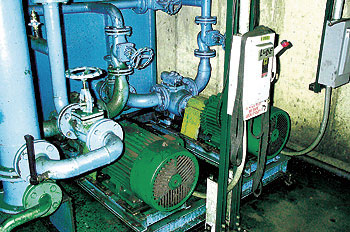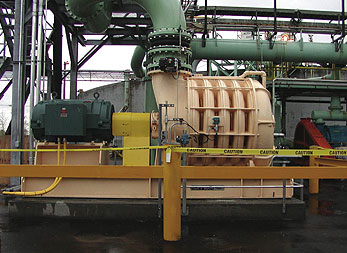Motor Swaps Save Big
Replacing old standard motors with high-efficiency units is achieving big savings in operating costs, for both large and small companies, including Kodak, Outokumpu Copper Products and Weyerhaeuser. Besides the energy savings, the swaps offer other advantages: higher reliability, longer motor life, lower inventory of spares and fewer costly interruptions of production.
By replacing hundreds of old motors at its huge research and manufacturing center in Rochester, New York, Kodak has cut energy use by 15% and carbon dioxide emissions from its two on-site power plants by 16%. Even though Kodak operates several large shops that together rebuild more than 500 motors annually, the company still prefers to replace old standard motors with NEMA Premium-rated motors.
When it does rebuild motors, they are mostly DC vehicle or special-purpose motors for which there are no EPAct (1992 Energy Policy Act) or NEMA (National Electrical Manufacturers Association) standards. It's also worth noting that when an induction motor is rebuilt it can lose up to two percent of its efficiency.
Lower Inventory of Spares
Depending on the selection, operation and application of motors, typical paybacks on 200-hp motors are about three years, and about 13 months for 10-hp motors. Bob Steele, who coordinates Kodak's Total Motor Program, reports very fast payoffs for Kodak. Also, of particular importance, he says, is the smaller inventory of spares that results when premium-efficiency motors are specified - this not only means tying up much less cash, it also reduces Kodak's tax liability.
Steele has calculated that the mean time for replacement of the premium motors is nearly nine years. Although figures are not available due to a variety of plant changeovers in past years, Steele says the comparable mean time for replacement for the prior standard motors was much shorter.
Another change in motor replacement was eliminating many suppliers and buying the premium-efficiency motors from a single local supplier, Kaman Industrial Technologies. Substantial volume discounts result.
Fast Payback
Buffalo-based Outokumpu is achieving extremely fast paybacks with NEMA Premium motors, according to purchasing director Christian Wojciechowski. When the cost of rewinding an old motor is compared to the cost of a new motor and its resulting energy savings, the payback for the new motor is less than one and a half years. At Outokumpu, the rule is not to bother rewinding but to install a NEMA Premium when standard motors smaller than 50 hp fail. For motors of more than 50 hp, if the rewinding cost is more than 50% of the cost of a new motor, then a new premium-efficiency motor is purchased. As at Kodak, the only exceptions are special purpose motors to which EPAct and NEMA standards don't apply.
 Two 100-hp NEMA Premium motors (painted green) driving lubricant pumps at Outokumpu's rolling mill. Payback through energy savings was achieved in less than two years.
Two 100-hp NEMA Premium motors (painted green) driving lubricant pumps at Outokumpu's rolling mill. Payback through energy savings was achieved in less than two years.In addition to installing premium motors, Outokumpu is also saving by relying on 100% copper wound transformers. These efficient transformers are part of new, solid state power supplies. They replace 11 inefficient motor generator sets that converted AC power for DC motors, some as large as 5,000 hp. Because of the resulting reduced energy demand, the company qualified for a $248,000 rebate from the local power company.
Big Motors Too
Choosing the right motors is important for the Weyerhaeuser Company because it uses, or has in inventory, tens of thousands of motors. The company is also committed to saving energy. That's why it has adopted a policy of buying new motors with an efficiency one percent higher than motors that just meet EPAct standards, says John Holmquist. He's a senior scientist, Electrical Power and Energy, for Weyerhaeuser Engineering. Because EPAct and NEMA Premium standards don't apply to very large motors, the company's policy is to buy only those of high efficiency (see photo above). The company also opts for higher efficiency for its hundreds of transformers.
Weyerhaeuser has a policy of replacing any 60-hp or smaller motors that fail with higher-efficiency models, regardless of the condition, age or rebuild history of the motor. There's another reason why the company found it not practical to rebuild motors: half of all rewound motors lasted only 3.5 years. As a result of their high-efficiency policy, Weyerhaeuser is saving much in energy costs annually, even though it pays only four cents per kWh. However, the greater gain from premium-efficiency motors, says Holmquist, is much less downtime.
 Large motors like the 1,250-hp motor (at left) driving an aeration blower are not covered by EPAct or NEMA Premium standards. That's why Weyerhaeuser chooses only those with efficiencies comparable to that of the best motors available.
Large motors like the 1,250-hp motor (at left) driving an aeration blower are not covered by EPAct or NEMA Premium standards. That's why Weyerhaeuser chooses only those with efficiencies comparable to that of the best motors available.Fewer costly interruptions in production is another major advantage that Holmquist emphasizes. When a motor fails, production is not only halted, there are also costs associated with removing the failed motor and installing a replacement.
There is no federal law mandating higher-efficiency transformers, yet Weyerhaeuser buys only high-efficiency, copperwound, cast-coil models. Their hundreds of transformers supply power to large motors that operate at high voltages.
Kaman:
585-254-8060;
www.kaman.com
Kodak:
800-242-2424;
http://www.kodak.com/ek/US/en/corp/default.htm
Outokumpu:
716-879- 6836;
www.outokumpu.com
Weyerhaeuser:
1-800-525-5440;
www.weyerhaeuser.com
Also in this Issue:
- Heavenly Copper
- Copper Could Help Counter Health Crisis
- Lady Liberty Provided Copper for Chopper
- Copper to Reveal Comet’s Makeup
- Motor Swaps Save Big
